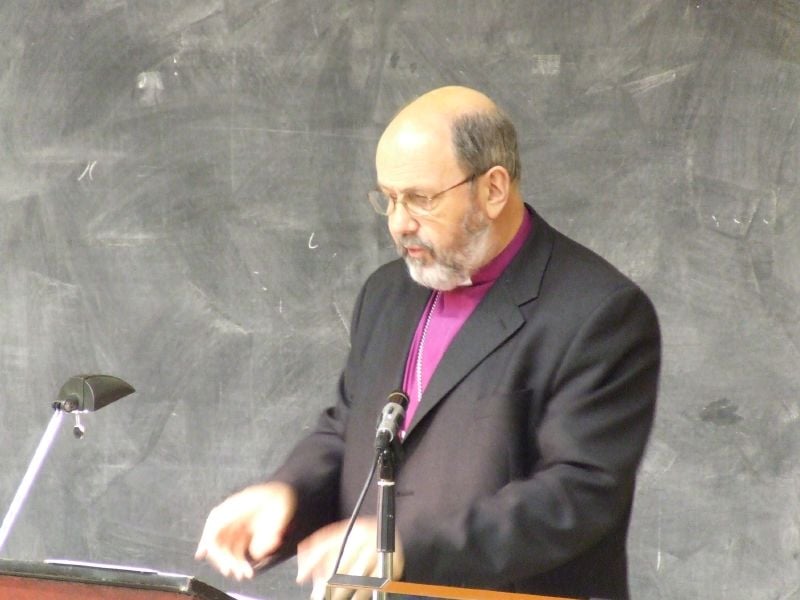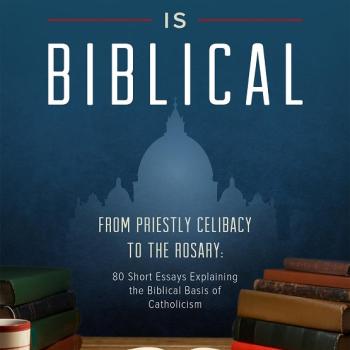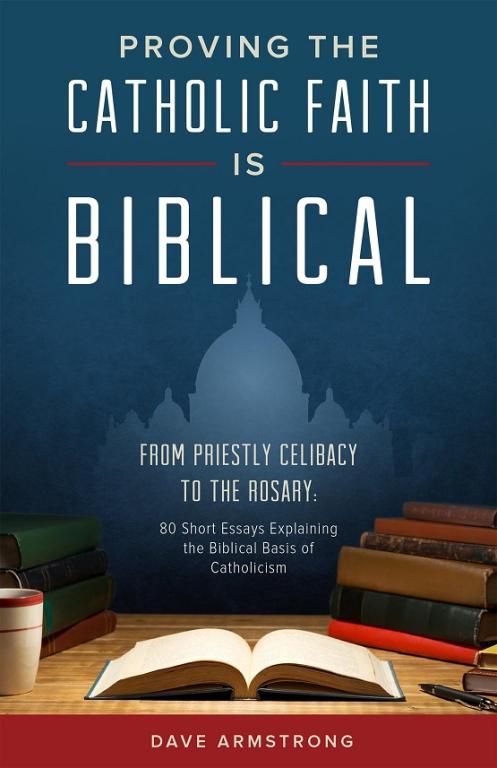We believe in
sola gratia as you do, but reject
sola fide as an unbiblical innovation. The fact remains that works are profoundly involved in the salvation (ultimately by grace) in some sense:
St. Paul on Grace, Faith, & Works (50 Passages) [8-6-08]
Catholic Bible Verses on Sanctification and Merit [12-20-07]
They are even central to the criteria of how God will decide who is saved and who isn’t, as I have proven from no less than 50 Bible passages:
Final Judgment in Final Judgment & Works (Not Faith): 50 Passages [2-10-08]
We interpret all this in a non-Pelagian fashion. We incorporate all of Scripture, not just our favorite pet verses. You guys simply ignore this data or act as if it is only in the realm of sanctification and has nothing whatever to do with salvation, which is absurdly simplistic and unrealistic in the face of the overwhelming data showing otherwise.
Paul’s focus in Galatians is on the means by which justification is attained (Galatians 3:2), not whether justification is attributed to grace. The idea that one can seek justification through a combination between faith and works, as long as the process is attributed to grace, is a contradiction of what Paul taught. If works are absent from Genesis 15:6, Acts 10:44-46, Galatians 3:2, and other relevant passages, then saying that the works are preceded by and accompanied by grace doesn’t make sense. There are no works for grace to accompany in such passages. To make this a matter of whether the works are attributed to grace is to get the gospel fundamentally wrong. There’s no need to discuss whether non-existent works are works of grace or graceless works. The gospel shuts us up to faith, not to a combination between faith and gracious works (Galatians 3:21-25).
Then why are works always central in every discussion of the final judgment that I could find in Scripture (50 passages: linked to above)?
The final judgment involves more than the means by which the justified attained that justification. It also involves the means by which the unregenerate are condemned, the vindication of the justified, and the non-justificatory rewarding of those individuals. I wouldn’t expect the final judgment to not involve works. In the post you’re responding to, I cited some examples of passages that are about how we attain justification. They don’t just exclude graceless works. They exclude works of any type. Many other such passages could be cited, as I discuss here and here.
Why is this the case if God is supposedly wanting to completely separate any notion of works or acts from salvation itself?
We wouldn’t have to know why works are excluded in order to know that they’re excluded. But it’s a good question, and I addressed it in a post last year.
I agree with what C. S. Lewis said: asking one to choose between faith and works is as senseless as saying which blade of a pair of scissors is more important.
It’s an organic relationship. Actually, Catholics and Protestants, rightly understood, are not far apart on this in the final analysis. It’s mostly mutual misunderstandings and unfortunate semantic confusion.
I wouldn’t expect the final judgment to not involve works.
Good. That’s part of the common ground I alluded to.
But then my question would be: why is the aspect of faith (let alone faith alone so glaringly absent in these 50 accounts of judgment (I think only one mentioned it at all, in my list), if in fact it is the central, fundamental consideration, according to Protestantism?
It’s just not plausible. The Bible doesn’t at all read as it should, were Protestant soteriology true, and Catholic soteriology false. I contend that it would read much differently indeed. As it is, it appears to overwhelmingly favor the Catholic positions.
Central to what? All that the judgment involves? No. The unjustified are condemned for their sins, so works are relevant to their judgment. And the justified are reconciled to God through faith alone (Ephesians 2:8-9) for good works (Ephesians 2:10). The works evidence the faith (vindication), and the works determine non-justificatory rewards. Mentioning works is an effective way of summarizing the judgment, since it brings together so many of the relevant themes. Even when a passage only mentions works with regard to the judgment, we have to keep the nearby context in mind. The original authors (or speakers) didn’t expect their audience to take their comments in isolation, ignoring the context. Those who hear Jesus speak of works in Matthew 25:31-46 know that He was carrying out a ministry in which He forgave, pronounced peace, and healed people upon their coming to faith (see here). Those who heard Jesus speak of works in John 5:29 would also have known that He spoke of reconciliation through faith and avoidance of condemnation as a result of that faith in John 5:24. Those who believe are assured of the future resurrection of life (John 11:25-26). When Paul says that men will be judged by his gospel (Romans 2:16), he doesn’t expect his audience to ignore everything he said about justification through faith and think only of works. Works are relevant, for reasons explained in my last paragraph, but nobody reading Paul in context would think that summarizing statements that only mention works are meant to exclude what Paul said about faith. To ignore the role of faith in his gospel would cause a major distortion of his message. Paul speaks of deliverance from future wrath through Jesus’ blood (Romans 5:9) after having said that the deliverance through that blood was received through faith (Romans 5:1). Etc. And I point out, again, that citing passages on the final judgment doesn’t explain the line of evidence I mentioned earlier. As we see over and over again in Jesus’ ministry and Paul’s, people are justified through faith alone, as illustrated in the paradigm case of Abraham in Genesis 15:6. There is no issue of whether the works involved are works of grace or graceless works, since works of both types are absent.
Thanks very much for your reply, and especially for sticking directly to the issues. I think you have answered well from within your own paradigm, and it is interesting to learn how you answer the question I asked. I truly do appreciate it.
I disagree, of course, but as I said, I didn’t come here to debate. Let me conclude, if I may, by briefly clarifying that the Catholic position is not saying to ignore faith or grace (the content of your entire long second paragraph). Our position is that salvation is by grace alone, through faith, which is not alone, and includes works by its very nature.
So all your warnings about “ignoring” faith are non sequiturs, as far as Catholicism is concerned, and a rather large straw man, if you are intending to target Catholic soteriology there.
The point of my paper and question about it is not to stake out some “works alone” position (which would, of course, be a Pelagianism that Catholics totally reject as heresy), but to note that it is rather striking that only works are mentioned in the judgment passages, and never faith alone (and faith at all only once out of 50).
I realize that the Catholic view involves grace and faith as well, which is why I previously referred to faith rather than “a combination between faith and gracious works” in reference to Galatians 3:21-25, for example. The second paragraph in the post you’re responding to was meant to be an explanation of the intention of the Biblical authors, not a response to Catholicism.
In another paper I mentioned here I cite 50 passages from Paul that exhibit the threefold scenario of grace-faith-works.
We also get accused of believing in “sola ecclesia” when in fact our position on authority is the “three-legged stool” of Scripture-Tradition-Church. It’s simply Protestant either/or thinking applied to us.
Thanks again, and I will record your complete reply in a post I’ll make on the topic. You or anyone else is always welcome to comment on my site about anything.
Merry Christmas to you and yours.
* * *
I don’t see how some of the passages I mentioned in my last post, such as John 11:25-26 and Romans 5:1-9, can be exempted from an examination of judgment passages. When people are assured of a future in Heaven, the resurrection of life, the avoidance of God’s wrath in the future, etc. on the basis of faith, why wouldn’t such passages be relevant to the subject you’re addressing?
They are thematically related insofar as they are also soteriological, but my 50 passages had specifically to do with final judgment, God’s wrath, and eschatological salvation.
That came about because I was asked in debate with Matt Slick (the big cheese at CARM) what I would say if I got to heaven and God asked me why I should be let in. I replied that we had biblical data as to what God would actually say at such a time, and it was all about works, not faith alone at all. And I found that quite striking (after studying it in greater depth), though it never surprises me to find profound biblical support for Catholicism. I always do whenever I study the Bible.
Romans 5:9 does mention God’s wrath, but it is a generalized, proverbial-like statement (such as often found in, e.g., 1 John), rather than particularistic and eschatological, which is what I was talking about in my paper.
John 11:25-26 is of the same nature, and moreover, if we look at it closely, we see that the Greek for “believe” is pistuo, which is considered the counterpart of “does not obey” (apitheo) in John 3:36. 1 Peter 2:7 also opposes the two same Greek words. In other words, “believe” in the biblical sense already includes within it the concept of obedience (i.e., works). Hence, “little Kittel” observes:
pisteuo as “to obey.” Heb. 11 stresses that to believe is to obey, as in the OT. Paul in Rom. 1:8; 1 Th. 1:8 (cf. Rom. 15:18; 16:19) shows, too, that believing means obeying. He speaks about the obedience of faith in Rom. 1:5, and cf. 10:3; 2 Cor. 9:13. (p. 854)
Jesus joins faith (“belief” / pistuo) and works together, too, when He states:
John 14:12 (RSV) Truly, truly, I say to you, he who believes in me will also do the works that I do; and greater works than these will he do, because I go to the Father.
So even if one grants that these passages have to do directly with judgment and eschatological salvation (as I do not), it is still the case that the “belief” mentioned in them is (through cross-referencing) seen to include obeying and works, and we’re back to the Catholic organic relationship between the two, rather than the Protestant ultra-abstraction of the two into the justification and sanctification categories.
“Faith alone” is tough to verify from Scripture once everything is taken into account and not just the garden-variety Protestant passages that are always utilized.
* * *
In other words, ‘believe’ in the biblical sense already includes within it the concept of obedience (i.e., works).
I agree that faith is obedience, but it can be obedience without being work in any relevant sense. That’s why we’re told that people can believe without working (Romans 4:5-6), that justifying belief occurs in the heart (Acts 15:7-11, Romans 10:10), that works demonstrate faith (James 2:14-26), etc. Different terms are used to refer to faith and works, because they’re different concepts. They can have obedience in common without having some other things in common.
A reference to faith can’t be assumed to include outward action, much less a specific outward action like baptism. That’s why we often see baptism and faith distinguished, for example (Acts 8:12-13, 18:8, etc.). The fact that faith is obedience wouldn’t lead us to the conclusion that other forms of obedience can be included in references to faith.
The term “faith” and its synonyms aren’t all that are relevant here. When we read of a paralytic being lowered into a house, a man visiting a Jewish temple, a crucified man, or a man listening to the gospel being preached, we don’t define what that person is doing solely by a term like “faith”. Rather, we also take into account the evidence provided by the surrounding context. It would make no sense to conclude that a paralyzed man being lowered into a house or a man visiting a Jewish temple was being baptized simultaneously or that a man nailed to a cross or a man listening to Peter preach the gospel was giving money to the poor at the same time. We judge how these individuals were justified partially through the surrounding context, not just a reference to faith or some related term. Part of the problem with the Catholic gospel is that not only do so many of the relevant passages mention faith without mentioning works, but the surrounding context gives us further reason to believe that the relevant works aren’t involved.
So even if one grants that these passages have to do directly with judgment and eschatological salvation (as I do not)
How can a passage about resurrection life and never dying (John 11:25-26) not be directly relevant? Passages of a similar nature use other phrases that are likewise relevant to future judgment and salvation, such as “on the last day” in John 6:40. Your article includes John 5:26-29, so I don’t see a problem with including verse 24 as well. Themes of resurrection and judgment are already being discussed in verses 21-22. Yet, your article only cites verses 26-29.
Similarly, Romans 5:1-9 repeatedly brings up themes of hope for the future and deliverance from future wrath.
And I want to remind the readers of something I said earlier. The coming judgment is primarily a judgment of works even from the perspective of justification through faith alone. The unregenerate are condemned by their works, and the regenerate are justified in order to do (Ephesians 2:10), vindicated by, and rewarded for their works. The emphasis on works in judgment passages doesn’t tell us, though, whether works are a means of justification. The dispute isn’t about whether works are relevant to the judgment, but rather the type of relevance they have.
Thanks for the continuing excellent discussion. Just one point:
the regenerate are justified in order to do (Ephesians 2:10), [be] vindicated by, and rewarded for their works. The emphasis on works in judgment passages doesn’t tell us, though, whether works are a means of justification.
This is classic Protestantism, of course: works are relegated to post-justification status, as part of a separate sanctification and the realm of differential rewards of those already saved. I used to believe the exact same thing, so I’m very familiar with it.
The problem is that Scripture doesn’t teach such a view. The disproofs are already in my paper, in many passages that directly connect or associate salvation with the works that one does: therefore, works are not unrelated to either justification or eschatological salvation, as you claim they are:
Matthew 25:34-36 Then the King will say to those at his right hand, `Come, O blessed of my Father, inherit the kingdom prepared for you from the foundation of the world; for I was hungry and you gave me food, I was thirsty and you gave me drink, I was a stranger and you welcomed me, I was naked and you clothed me, I was sick and you visited me, I was in prison and you came to me.’
The “for” shows the causal relationship: “you are saved because you did all these works.” That’s what the text actually asserts, before false Protestant presuppositions and eisegesis are applied to it in the effort to make sure works never have to do directly with salvation (no matter how much faith and grace is there with them, so that we’re not talking about Pelagianism).
If Protestantism were true, the Bible should have had a passage something like this (RPV):
But when the Son of Man comes in His glory, and all the angels with Him, then He will sit on His glorious throne. Then He will also say to those on His left, “Depart from Me, accursed ones, into the eternal fire which has been prepared for the devil and his angels; for you did not believe in Me with Faith Alone.” These will go away into eternal punishment, but the righteous who believed with Faith Alone into eternal life.
But alas, it doesn’t read like that, does it?
John 5:28-29 . . . the hour is coming when all who are in the tombs will hear his voice and come forth, those who have done good, to the resurrection of life, and those who have done evil, to the resurrection of judgment.
A direct correlation: the ones who do good works are saved; the ones who do evil are damned.
Romans 2:6-8, 13 For he will render to every man according to his works: To those who by patience in well-doing seek for glory and honour and immortality, he will give eternal life; but for those who are factious and do not obey the truth, but obey wickedness, there will be wrath and fury. . . . For it is not the hearers of the law who are righteous before God, but the doers of the law who will be justified.
Again, works are directly tied to eternal life and justification; they are not portrayed as merely acts of gratefulness that will lead to differential rewards for the saved; no, the differential reward is either salvation or damnation. Paul totally agrees with Jesus.
2 Thessalonians 1:7-9 . . . when the Lord Jesus is revealed from heaven with his mighty angels in flaming fire, inflicting vengeance upon those who do not know God and upon those who do not obey the gospel of our Lord Jesus. They shall suffer the punishment of eternal destruction and exclusion from the presence of the Lord and from the glory of his might,
Note that simply believing the gospel and knowing God is not enough for salvation. One has to also “obey the gospel” (and that involves works).
Revelation 2:5 Remember then from what you have fallen, repent and do the works you did at first. If not, I will come to you and remove your lampstand from its place, unless you repent.
If we don’t do the works, we can lose our salvation; therefore works have to do with salvation; they are not separated from that by abstracting them into a separate category of sanctification, that is always distinguished from justification. That ain’t biblical teaching. That is the eisegesis and false premises of Melanchthon and Calvin and Zwingli.
Revelation 20:11-13 Then I saw a great white throne and him who sat upon it; from his presence earth and sky fled away, and no place was found for them. And I saw the dead, great and small, standing before the throne, and books were opened. Also another book was opened, which is the book of life. And the dead were judged by what was written in the books, by what they had done. And the sea gave up the dead in it, Death and Hades gave up the dead in them, and all were judged by what they had done.
Same thing again. Obviously, St. John, St. Paul, and our Lord Jesus need to attend a good Calvinist or evangelical seminary and get up to speed on their soteriology. They don’t get it. The passage should have been written something like the following:
. . . and the dead were judged from the things which were written in the books, according to whether they had Faith Alone. And the sea gave up the dead which were in it, and death and Hades gave up the dead which were in them; and they were judged, every one of them according to whether they had Faith Alone.
Perhaps we should get together a council and rewrite the Bible so that it doesn’t have so many “Romish” errors throughout its pages . . . :-) The King James White version or sumpin’ . . . :-)
* * *
Part of the problem with the Catholic gospel is that not only do so many of the relevant passages mention faith without mentioning works, but the surrounding context gives us further reason to believe that the relevant works aren’t involved.
I can easily flip that around, based on the biblical data I have been highlighting:
“Part of the problem with the Protestant gospel is that not only do so many of the relevant passages mention works without mentioning faith (and especially not faith alone), but also the surrounding context gives us further reason to believe that faith alone isn’t involved.”
Since the Catholic believes in the triumvirate of GRACE—>faith—>works as the criteria for salvation, passages dealing with faith pose no problem. The more the merrier. We are saying that faith alone is the unbiblical doctrine, not faith. We’re not against faith at all, but rather, a false definition of faith, that restricts and confines it in a way that the Bible doesn’t do.
But since your position is faith alone (in terms of salvation itself), you have to explain away or rationalize all passages suggesting an important place of works in the equation, in a way that we’re not required to do (given our position) with all the passages about faith that you produce.
So you claimed, for example, that “The emphasis on works in judgment passages doesn’t tell us, though, whether works are a means of justification.” I have now produced six, plain, clear passages that do do just that. And that has to be explained from your paradigm.
I’m sure you will attempt some sort of explanation for your own sake (if even just in your own mind), because if you fail to do so, you would be forced to give up Protestant soteriology. The stakes are high.
But in any event, bringing out ten, twenty, fifty passages that mention faith does nothing against our position, because we don’t reject faith as part of the whole thing.
The problem for your side remains: how to interpret the centrality of works in the judgment / salvation passages like the six I dealt with in my last two postings, in a way that preserves the “faith alone” doctrine.
I contend that it is impossible. To do so does violence to the Bible and what it teaches. We must base our teaching squarely on biblical theology and not the arbitrary, self-contradictory traditions of men (folks like Calvin), who eisegete Holy Scripture and substitute for biblical thought, their own traditions.
Sometimes it’s easy to confuse those traditions with biblical teaching itself. But by examining Holy Scripture more deeply and over time, I think anyone can eventually see that it supports the Catholic positions every time.
That’s why we continue to see folks who study the issues deeply moving from Protestantism to Catholicism (such as Francis Beckwith: the original subject of this post).
our article includes John 5:26-29, so I don’t see a problem with including verse 24 as well. Themes of resurrection and judgment are already being discussed in verses 21-22. Yet, your article only cites verses 26-29.
Fair point. I love discussions of context. Protestants too often ignore context, but you don’t, and I respect that and commend you for it. I have explained my criterion for inclusion in my article on final judgment and works: it depends on how exactly one decides to categorize; how one determines which is a directly eschatological passage or one having to do with judgment. Reasonable folks can differ on that, as there is a subjective element. Not every systematic theologian cuts off the passages they employ at the same exact point.
But as I have been saying, a consideration also of the larger context of John 5 does nothing to harm the Catholic case. You wrote:
many of the relevant passages mention faith without mentioning works, . . . the surrounding context gives us further reason to believe that the relevant works aren’t involved.
Using John 5 as an example (since you brought it up), we see that this doesn’t apply. You say 5:21-22 mentions resurrection and judgment. Fine; indeed it does But what it doesn’t do is give the criteria for these judgments and who is resurrected. That has to come by reading on (further context). You want to highlight 5:24:
. . . he who hears my word and believes him who sent me, has eternal life; he does not come into judgment, but has passed from death to life.”
I have explained that this is a generalized statement: one could perhaps paraphrase it as “Christian believers have eternal life” or (to bring it down to a Sunday School nursery level): “all good Christians go to heaven.”
It doesn’t follow from a general statement like this that no Christian can ever fall away (though Calvinism requires this, over against many biblical passages to the contrary), or that works have nothing to do with it. We need to look at the deeper meaning of “believe” (as I have already done).
As we read on (the same discourse from Jesus) we get to 5:29:
. . . those who have done good, to the resurrection of life, and those who have done evil, to the resurrection of judgment.”
Now, you want to highlight 5:24 and de-emphasize 5:29. I can gladly consider both of them in the entire equation. It’s once again the Catholic (Hebraic) “both/and” vs. the Protestant (and more Greek) “either/or”. Scripture is asserting two truths:
5:24 “he who hears my word and believes him who sent me, has eternal life”
5:29 “those who have done good, to the resurrection of life,”
Faith and works. For us, the two passages are entirely compatible and in harmony with our Catholic theology: one is saved by grace through faith, in believing in Jesus, and this belief entails and inherently includes good works.
But you guys can’t do that, because you wrongly conclude that any presence of good works in the equation of both justification and salvation itself is somehow “anti-faith” or antithetical to grace alone; and is Pelagianism. This doesn’t follow.
But because you believe this (the false, unbiblical premise), you have to explain 5:29 as merely differential rewards for the saved (who are saved by faith alone); whereas the actual text does not teach that. It teaches a direct correlation between good works and eternal life. It explains 5:24 in greater depth; just as I noted earlier that Jesus Himself places works and faith in direct relationship:
John 14:12 Truly, truly, I say to you, he who believes in me will also do the works that I do . . .
That’s why we often see baptism and faith distinguished, for example (Acts 8:12-13, 18:8, etc.).
Ah, but baptism (odd that you should bring up that example) is also equated with regeneration and entrance into the kingdom, so this is hardly an example amenable overall to your position:
Acts 2:38, 41 And Peter said to them, “Repent, and be baptized every one of you in the name of Jesus Christ for the forgiveness of your sins; and you shall receive the gift of the Holy Spirit.” . . . So those who received his word were baptized, and there were added that day about three thousand souls.
The order is not:
1) faith
2) forgiveness
3) indwelling Holy Spirit
4) baptism
but rather,
1) faith
2) baptism
3) forgiveness (directly because of baptism)
4) indwelling Holy Spirit (directly because of baptism)
Because of the baptism, souls were added to the kingdom. They weren’t already in the kingdom, and then decided to be baptized out of obedience. Therefore, the work of baptism directly ties into both justification and final salvation.
Galatians 3:26-27 for in Christ Jesus you are all sons of God, through faith. For as many of you as were baptized into Christ have put on Christ.
Colossians 2:12 and you were buried with him in baptism, in which you were also raised with him through faith in the working of God, who raised him from the dead.
Faith and baptism are virtually equivalent in their importance. One is “in” Jesus both through faith and through baptism. Both/and.
Baptism is not a separate, optional work. It is part and parcel of the process. Insofar as it, too, is regarded as a “work” then here we have again the Catholic grace-faith-works (and efficacious sacraments) paradigm.
* * *
Jason gave further answers in a three-part reply (one / two / three). I then wrote in conclusion:
Hi Jason,
We could go round and round on this forever, and keep trying to poke holes in each other’s arguments. Again, I think you have answered very well from within your paradigm. You can have the last word.
Thanks for sticking entirely to theology and avoiding any hint of personal attack. How refreshing, and a model to be emulated.
Merry Christmas to you and yours and all here.



























